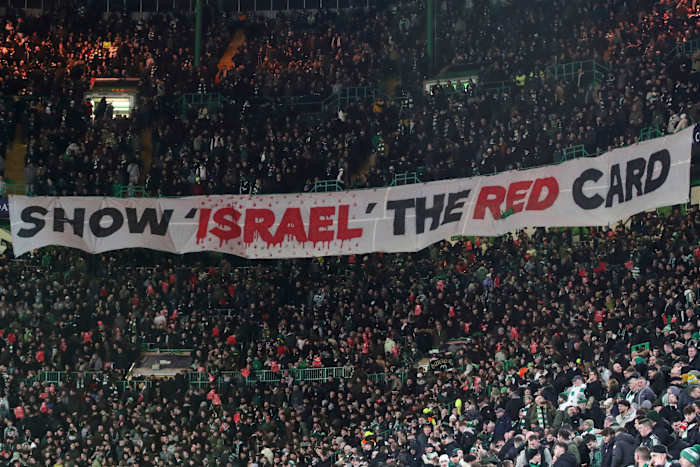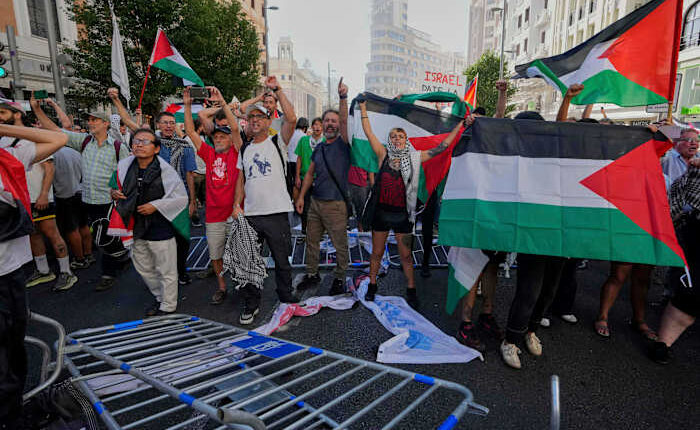Share this @internewscast.com

GENEVA – In Spain, a prominent cycling event was thrown off course by protests against an Israeli team, while in Poland, the Israeli national anthem was met with boos during a basketball game. Additionally, several European nations are considering boycotting a major entertainment event if Israel participates.
The international reaction against Israel, due to the humanitarian impact of the conflict in Gaza, has spilled over into sports and cultural activities. Critics of Israel argue that it should face international exclusion similar to Russia’s exclusion following its extensive invasion of Ukraine in 2022.
While Russia has been broadly condemned and penalized with Western sanctions, Israel has not been banned from global sports platforms like the International Olympic Committee or FIFA. Apart from a lesser-known global Muay Thai organization, there has been minimal movement to ban Israeli athletes from competing under their national banner.
This week, Spanish Prime Minister Pedro Sánchez intensified the debate by supporting pro-Palestinian demonstrators who interrupted the Spanish Vuelta cycling race, advocating for a boycott of Israel from international sports events until the “barbarity” in Gaza concludes. Following this, Spain’s national broadcaster, along with three other European nations, threatened to pull out of the Eurovision Song Contest next year—a contest cherished in Israel and Europe—if Israel’s participation is confirmed.
At the beginning of the month, several figures from Hollywood, including filmmakers and actors, committed to refusing engagement with Israeli film institutions, encompassing festivals, broadcasters, and production companies.
Why, Sánchez asked, shouldn’t Israel be expelled from sports just like Russia?
“This is different,” the IOC’s executive director for Olympic Games, Christophe Dubi, said this week in Milan when asked to compare the two.
The IOC and FIFA have indicated that the conditions warranting action against Russia do not apply to Israel, without providing comprehensive clarifications. The IOC articulated that Israel has not violated the Olympic Charter, unlike Russia during its annexation of eastern Ukraine territories. Furthermore, European soccer bodies and clubs continue to engage with Israeli teams without objection.
FIFA declined a request for comment on its Israel policy and the delayed work of two panels reviewing formal complaints by the Palestinian soccer federation, which has long tried to bar Israel from competition over its treatment of Palestinians.
Israel reacts strongly to Spanish prime minister’s comments
Israel reacted strongly to Sánchez’ call for a sports boycott. Foreign Minister Gideon Saar called the Spanish leader an “antisemite and a liar.” Israel has dug in its heels in the face of international isolation and criticism of its military campaign, which came in response to the Oct. 7, 2023, attack on Israel by Hamas-led militants.
The most notable exclusion from international sports was imposed on Apartheid-era South Africa. It did not compete at any Olympics after 1960 until the 1992 Barcelona Summer Games, two years after Nelson Mandela was released from prison.
Russia was swiftly blacklisted by most sports federations after the February 2022 invasion of Ukraine. Its athletes competed under a neutral flag at the Paris Olympics.
Currently there is no momentum for Israel to face the same fate. Still, some analysts said the move by Spain is significant, not least because it is a major soccer power set to co-host the 2030 World Cup. It also will host an NFL game next month and the opening stage of next year’s Tour de France bike rice.
“Until now we haven’t seen this type of outrage against Israeli action in Gaza,” said Antoine Duval of the Asser Institute, a Netherlands-based think tank. “I think this tide is turning now.”
Sports federations have complained about playing Israeli teams
How impactful Spain’s move will be remains to be seen. No world leader has so far followed Sánchez’ call for excluding Israel from international sports.
On Thursday, a British lawmaker in Birmingham called on European soccer body UEFA to “urgently cancel” soccer team Aston Villa’s Nov. 6 Europa League match against Israeli club Maccabi Tel Aviv “to ensure public safety and community harmony.” UEFA has not shown any indication it will do so.
Israel’s culture and sports ministry didn’t return messages seeking comment.
In Europe, several sports federations have groused about having to play Israeli teams, while noting they have no choice since Israel isn’t banned from international competitions.
“Facing Israel in these circumstances is not a scenario we would wish,” Basketball Ireland chief executive John Feehan said last month about being drawn to play Israel in a Women’s Eurobasket qualifying game in November. “But there has been no change in Israel’s status within sport.”
Feehan said Ireland’s basketball federation could face sanctions “should we elect not to play, which would be hugely damaging to the sport here.”
In men’s soccer, Italy and Norway will host Israel next month in a World Cup qualifying matches and both federations spoke this week of their dissatisfaction with the situation.
Italian soccer leader Gabriele Gravina said he was “well aware of the sensitivity of Italian public opinion” about the Oct. 14 game in Udine. But refusing to play would result in a 3-0 loss by forfeit, according to FIFA’s rules.
“Not playing also means clearly saying we’re not going to the World Cup, we have to be aware of that,” Gravina said, adding that a boycott would instead help Israel advance closer to the finals tournament in the United States, Canada and Mexico.
Norway, which will play Israel on Oct. 11, said it would donate profits from ticket sales to Doctors Without Borders for its humanitarian work in Gaza.
Fans voice their protests against Israeli teams
When the Israel men’s national team played in Poland at Eurobasket last month, there were protests outside the arena in Katowice. Inside, the Israeli anthem was loudly booed by fans.
Last year, Maccabi Tel Aviv fans were involved in violent clashes with residents in Amsterdam while attending a soccer game there.
Protests inside stadiums are regularly seen in European soccer, even at the Champions League final in May. A “Stop Genocide In Gaza” banner in French was displayed during the game by Paris Saint-Germain fans congregated behind one goal in Munich.
UEFA did not open a disciplinary case, despite having rules prohibiting political messaging. It fueled the debate at its own Super Cup game in August: Before kickoff in Udine, banners saying “Stop Killing Children. Stop Killing Civilians” were laid on the field in front of the PSG and Tottenham players.
In tennis, Canada hosted Israel in the Davis Cup last weekend behind closed doors in Halifax, Nova Scotia, due to “escalating safety concerns.” The move came after hundreds of Canadian athletes and academics urged Tennis Canada to cancel the matches over Israel’s actions in Gaza and the West Bank.
In 2023, Indonesia lost hosting rights for the men’s Under-20 World Cup for FIFA rather than accept Israel playing on its turf. But its stance appears to have changed.
Israeli media reported in July that the country’s gymnastics federation was invited by Indonesia to send a team to the world championships in Jakarta later this year. Indonesia is currently in talks with the IOC to be considered as a host for the 2036 Summer Games.
Copyright 2025 The Associated Press. All rights reserved. This material may not be published, broadcast, rewritten or redistributed without permission.












